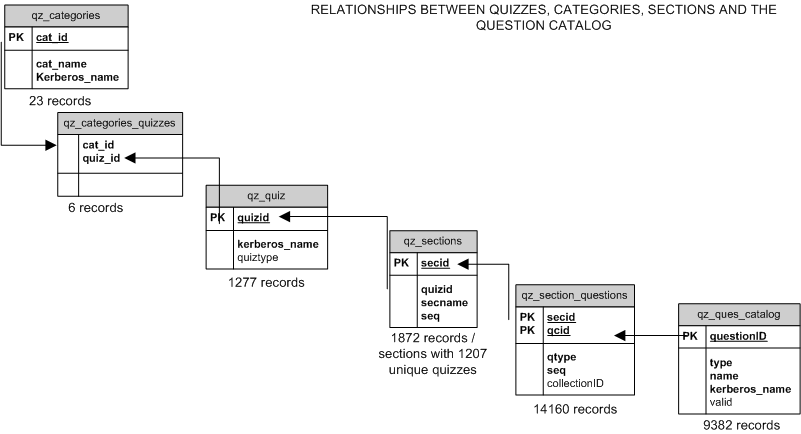RELATIONSHIP BETWEEN A QUIZ AND A COURSE
Quizzes exist independent of a course until the instructor or proxy user adds the quiz to a course via Website Builder. When the quiz is added to the course, a record is generated in page_metadata which generates a quiz link in the code based plus detail information like the order the quiz link appears on the page, release information, and whether the link is currently visible.
...
Selective releases are set by date, by person (e.g., to a particular student), by course (if using joined sections - specify particular sections for release), or by page (i.e., uses users stats to see if the person has viewed a particular page first.) Of the data to date, instructors chose to release quizzes by course, by date and by person. No instructors have used the release by page previously viewed function.
RELATIONSHIPS BETWEEN QUIZZES, CATEGORIES, SECTIONS AND THE QUESTION CATALOG
(Note: Graphic data valid on 1/13/06)
A top down review of the existing tables and data shows the following hierarchical structure for quizzes in the MyUCDavis cms. The hierarchy of Quiz Builder revolves around quizzes, quiz sections, questions, answers, and finally student response data associated with quiz attempts. In addition, the original design suggests a grouping mechanism for quizzes in a categories table, but these tables are so little used as to be negligible.
DATA ANALYSIS OF TABLE USAGE - QZ_QUIZ & QZ_SECTIONS
The key table here is qz_quiz which contains the primary key identifying the quiz (quizID), the quiz name, the kerberos_name of the owner, and quiz type information.
...
No quizzes with 9 sections
DATA ANALYSIS OF TABLE USAGE - QZ_QUES_CATALOG & QZ_SECTION_QUESTIONS
The qz_ques_catalog table contains all questions. Questionid is the primary key, with question name, question type, and kerberos_name as required fields. All relationships to answers and feedback are associated with this primary key, questionID.
(As of 1/30/06, there was a total of 313 unique question owners and 72 of these had more than 25 questions in their pool.)
...
